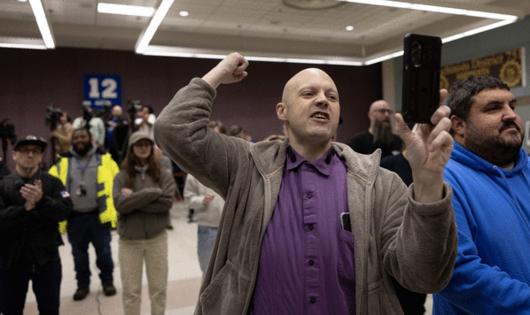Boeing Machinists approve new contract, ending strike
Published in Business News
SEATTLE — Striking Machinists voted Monday to approve the company’s most recent contract offer, ending a strike and enabling Boeing to begin restarting work at assembly plants in Everett and Renton that have been stopped for eight weeks.
Results announced late Monday showed the offer, which needed a simple majority to gain approval, was approved with 59% of ballots cast in favor.
The 33,000 Machinists in Boeing’s Puget Sound factories walked out Sept. 13, kicking off a strike that has left the company’s factories sitting idle and its financial position increasingly precarious.
Before Monday’s vote, Machinists had rejected two offers from Boeing as they pushed for greater concessions on wages, which have failed to keep up as living costs skyrocketed in the Seattle area over the past decade. The latest contract offer, put forward by Boeing on Thursday, included a 38% general wage increase over the next four years, which compounds to roughly 43% over the life of the agreement.
“This is a victory, we can hold our heads high,” said Jon Holden, president of the striking Machinists union local. “I’m proud of this membership, you stood strong and you stood tall and you won.”
Machinists were expected to begin returning to work on Wednesday.
Union leaders last week encouraged Machinists to accept this offer and end the strike. The union leadership said they believed it was the best offer they could achieve and cautioned members that Boeing CEO Kelly Ortberg had threatened that the company’s next one would be less generous if this offer did not pass.
The threat of a regressive contract offer weighed heavily on Machinists as they cast their votes Monday.
Jonathan Blubaugh, a Machinist at Boeing’s Seattle delivery center who has been with the company since 2008, voted to approve the contract because “if we turn this one down, the next contract is going to be worse,” he said. “I really hope it passes at this point.”
Rich Clark, a 29-year Boeing veteran who works in the paint division at Everett, wasn’t deterred by the threat of a regressive contract. Instead, it solidified his no vote.
“I don’t have a lot of compassion for Boeing,” he said. “Through some bad judgment on their part, we’re being asked to sacrifice on our end. … Any ultimatum is not a smart move with the union.”
Under the latest proposal, wages would increase 13% in the first year, then 9%, 9% and 7% in subsequent years.
The Machinists would also get a $12,000 cash bonus payable upon ratification of the new contract. That sum is a combination of the previous offer’s $7,000 ratification bonus and one-time $5,000 contribution to the 401(k) retirement.
The offer did not restore the defined benefit pension plan. Compared with the prior contract that expired this year, the latest proposal would bump up the Boeing matching contribution to the 401(k) to a maximum of 12% of annual income. That’s unchanged from the previous offer.
Clark said he didn’t feel much had changed from one offer to the next, and accused Boeing of playing a “shell game” with the $12,000 ratification bonus by making it appear as if the total amount had changed from the last offer.
Allen Lewis, a union steward who works at Boeing’s spare parts distribution center in SeaTac, said the threat that the next offer would be worse made him consider voting against the contract.
But in the end, Lewis decided to vote yes. He was disappointed that the offer did not include concessions on paid time off and vacations, but he was satisfied with the wage increase.
“We’ve pushed the company as far as we can,” Lewis said. “The money we’ll get at the end of the four years is huge. It’s almost like winning the lotto.”
While some workers were ready to cash in on the wage gains and happy to see how far Boeing had come from its initial offer — raising the general wage increase from 25% over four years to 38% — others said they still hoped to see more concessions for retirement benefits and paid time off and quicker progression steps to move through the ranks.
“It’s a step in the right direction, but I think they could do a little better,” Tony Craig, an 18-year Boeing veteran, said after casting his ballot outside Everett’s Angel of the Winds Arena.
Maiya Baise, who started at Boeing less than a year ago, voted against the contract and said she would keep saying no until the deal included a general wage increase of more than 40%, or an equivalent in retirement benefits.
Baise, 26, took a pay cut when she moved to Renton from Kentucky, where she had worked at a Ford plant. Ford workers went on strike last year, so “this isn’t my first go-around,” Baise said outside the Renton Hall on Monday as she cast her vote.
“I want something that can be a career for me. I want to know that this is probably an endgame if I choose for it to be,” Baise said. “I need them to invest in me, because I have invested a lot in moving here.”
The pension was still an important factor for those who voted no Monday, even though the company has said it will not restore the defined benefit plan that Machinists voted away 10 years ago.
Still, Stanley Parker, 62 and a 14-year Boeing veteran, said he would keep voting against the contract proposals until one included a pension.
“It’s a little on principle, but the raise will come eventually and we need something to retire on,” he said Monday outside the Everett polling location.
This was the second time union leadership had endorsed a contract offer. Union leaders initially endorsed a proposal in September, which, if accepted, would have avoided the strike entirely. Union members overwhelmingly rejected the offer in September and voted to strike.
Holden, the Machinists union District 751 president, told The Seattle Times last week that he made that endorsement because Boeing made the deal conditional on his recommendation.
The union declined to bring a second offer from Boeing to a vote in September because leadership said it did not meet members’ demands. The union’s leaders also objected to Boeing’s decision to release details of the offer to the media shortly after presenting it to the union’s negotiating committee.
Boeing and the union brought another offer to Machinists members in October, which was again voted down. That time, 64% of Machinists voted against the deal while 36% voted to accept the contract and return to work.
The latest offer retained other provisions of earlier contract proposals, including a minimum 4% annual bonus and a 100% company 401(k) match for up to 8%, on top of an automatic 4% company contribution. It also increases the amount of money that workers with a pension will receive each year.
The deal also maintained a commitment from Boeing to build its next new jet in the Puget Sound region, though some Machinists said that brings them little comfort because it is in place only during the life of the four-year contract.
Holden insists the commitment is meaningful, because to nullify it, Boeing would have to actively back out of the pledge during bargaining four years from now.
For some workers, the contract offer didn’t go far enough to guarantee the type of future they’d like to see at Boeing. Matt Chavez, who has worked at Boeing for seven years and voted no on the latest contract offer, said he’d like to see higher wages and better work-life balance.
“I want to be able to spend time on the planes I’m building,” he said.
“I’ve worked my body into the ground. When do I get appreciated for that? I’ve worked in the aerospace industry for 10 years. I know my worth.”
Patricia Travis, who has worked at Boeing for eight years, said Monday she switched from a no vote in October to a yes vote this time because she needs to get back to work. She had lined up a job at an Amazon distribution center set to start Nov. 13.
She said the cost of living in Everett, where she pays $1,600 in rent, is too high for her to remain on strike.
“People keep saying we’re fighting for our future, but I’m the future as well,” Travis said. “I need to work for my future.”
_____
©2024 The Seattle Times. Visit seattletimes.com. Distributed by Tribune Content Agency, LLC.



















Comments